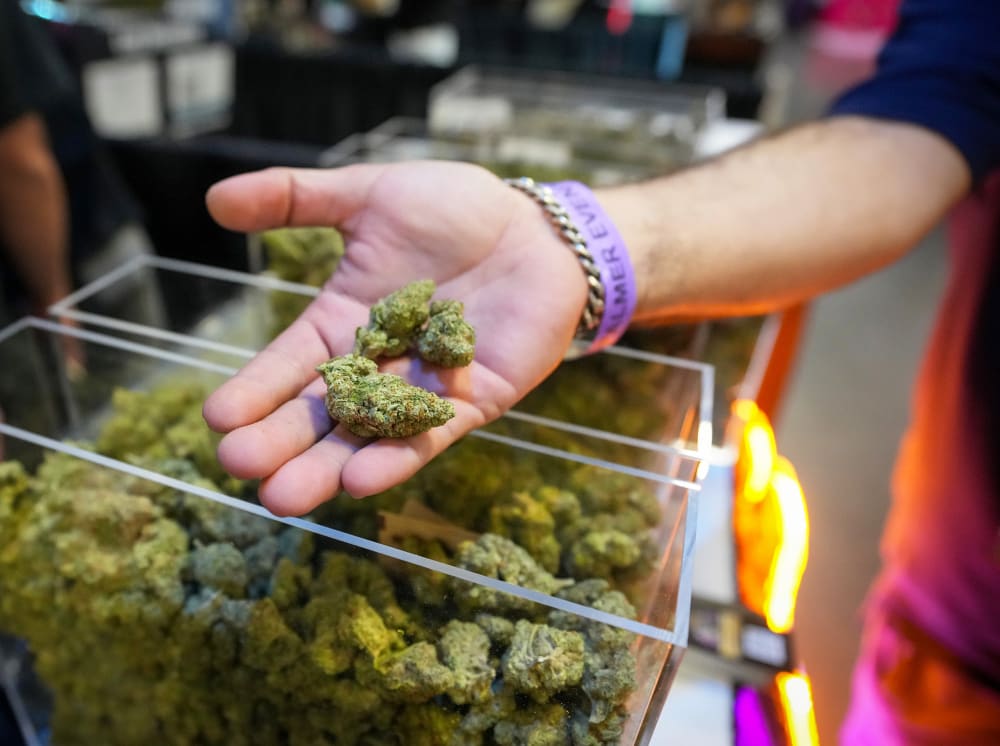America’s attention this week was rightfully focused on the back-and-forth negotiations on Capitol Hill over reopening the government. But quietly tucked away within the new funding bill, signed into law on Wednesday, is a ban on hemp-derived THC, one of Kentucky Sen. Mitch McConnell’s last wishes before departing the Senate. It’s language that could jeopardize an industry worth upwards of $30 billion — as well as the thousands of jobs it provides.
The provision doesn’t apply to state-regulated cannabis industries like those in New York or California, but rather a brand-new, evolving market that few consumers or retailers seem to fully understand.
Rather than ban synthetic cannabis products specifically, McConnell and other senators pushed for a blunt ban to crush the nascent industry entirely.
The story begins with the 2018 Farm Bill, a big package of agricultural spending priorities signed into law during President Donald Trump’s first term. Hemp, under the legislation, is defined as cannabis that contains less than 0.3% THC, the chief psychoactive compound responsible for getting a person high. But hemp and cannabis are biologically the same plant, and this distinction is purely legal, not scientific.
McConnell initially championed hemp legalization to help Kentucky’s struggling tobacco farmers, and the crop — which has many industrial applications, including rope, textiles and biofuels — has since become an important agricultural commodity.
But as federal progress toward cannabis legalization stalled under Trump, then Biden, and then Trump again, many companies figured out how to glean enough THC from legal hemp to create intoxicating products. These products, like edibles and infused seltzers, contain far more than 0.3% THC, though the raw material is, again, technically legal. The effect on the consumer, however, is one and the same. For example, an average joint you’d purchase in a dispensary may contain 15% to 20% THC.
While McConnell clearly never intended to legalize THC via the Farm Bill, the consequence of the bill created a “loophole” that companies exploited. And from that loophole, a $30 billion business blossomed, according to industry estimates.

Big mainstream retailers like Target and Total Wine & More have embraced these hemp products as younger consumers eschew alcohol for hangover-free THC drinks. And while many companies in the hemp space focus on consumer safety, others aren’t, using hemp to synthesize other forms of THC, like delta-8, and selling them to minors through gas stations or corner stores.
But with the funding bill, lawmakers failed to distinguish between the good actors, selling tested, low-dose THC seltzers in established stores, versus the bad, peddling synthetic THC products, often containing pesticides and heavy metals, through gas stations and illicit market locations. A number of Republicans spoke about their support for the ban in overzealous “Reefer Madness” terms — though notably, Sen. Ted Cruz, R-Texas, defected from his party as his home state tried and failed to ban hemp-based THC multiple times this year — as they fear-mongered over minors getting stoned on synthetics.
There are genuine public health concerns about the unregulated sale of synthetic cannabis products, especially when sold to minors. But rather than ban synthetic cannabis products specifically, or even simply mandate “age-gating,” McConnell and other senators pushed for an outright ban to crush the nascent industry entirely.
In other words, lawmakers who don’t fully understand the issue threw the baby out with the bathwater.

But McConnell’s Kentucky counterpart, Sen. Rand Paul, fell on the opposite side of the issue. He forced an 11th-hour vote to strike the language from the broader funding bill on Monday night in an effort to save Kentucky’s hemp industry — though it was resoundingly defeated. It’s also the first time that the Senate held a vote on the de facto legality of THC, though given the mix of priorities at stake, it clearly wasn’t a standalone issue.
The core issue here is not just consumer safety or access to these hemp products. It’s jobs, livelihoods and a real opportunity to further normalize cannabis in America, regardless of what Trump decides to do on pushing reform.











